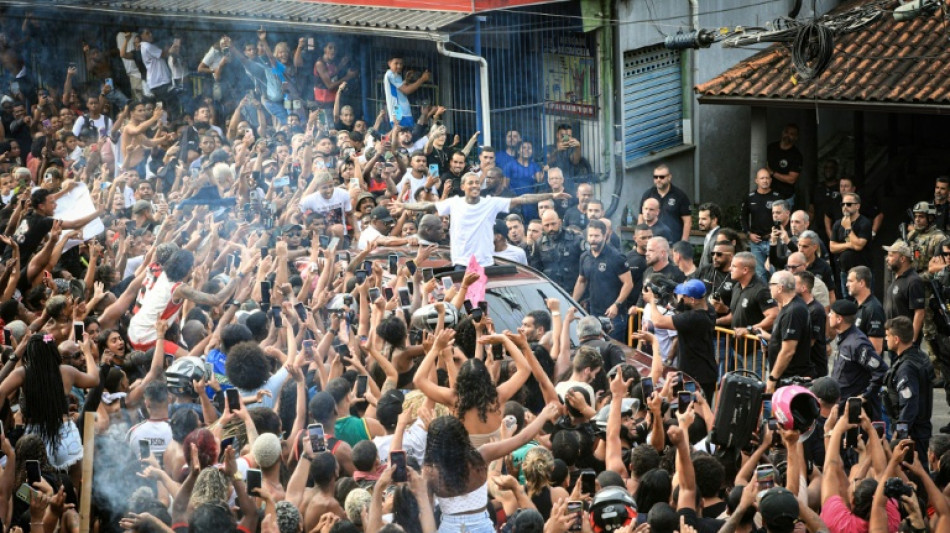
-
 AI search pushing an already weakened media ecosystem to the brink
AI search pushing an already weakened media ecosystem to the brink
-
New Zealand former top cop charged over child porn, bestiality material

-
 Messi out indefinitely with 'minor muscle injury': club
Messi out indefinitely with 'minor muscle injury': club
-
Robertson names one uncapped player in All Blacks squad

-
 Swiatek crashes out of WTA Canadian Open, Osaka races through
Swiatek crashes out of WTA Canadian Open, Osaka races through
-
Lyles says best to come after testy trials win
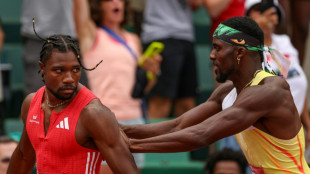
-
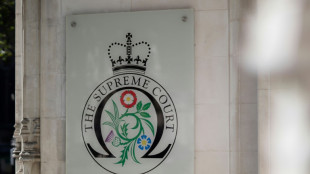 UK lenders face $12 bn plus compensation bill despite court ruling: watchdog
UK lenders face $12 bn plus compensation bill despite court ruling: watchdog
-
Man United draws Everton, West Ham blanks Bournemouth in US tour finales

-
 Coleman defends 'great person' Richardson after assault controversy
Coleman defends 'great person' Richardson after assault controversy
-
Lyles, Jefferson-Wooden storm to victories at US trials

-
 De Minaur survives Tiafoe to reach Toronto quarter-finals
De Minaur survives Tiafoe to reach Toronto quarter-finals
-
Young captures long-awaited first PGA Tour win at Wyndham Championship

-
 Osaka roars into WTA Montreal quarter-finals as Keys fights through
Osaka roars into WTA Montreal quarter-finals as Keys fights through
-
West Ham blanks Bournemouth in Premier League US series

-
 White's two homers drive Braves to 4-2 win over Reds in MLB Speedway Classic
White's two homers drive Braves to 4-2 win over Reds in MLB Speedway Classic
-
Bolsonaro backers rally to praise Trump for Brazil pressure

-
 Richardson exits 200m at US trials, Coleman through
Richardson exits 200m at US trials, Coleman through
-
Ferrari boss confident 'frustrated' Hamilton will bounce back after Hungarian GP

-
 Chelsea sign Dutch defender Hato from Ajax
Chelsea sign Dutch defender Hato from Ajax
-
'Fantastic Four' stretches lead to 2nd week at N.America box office

-
 Japan's Yamashita wins Women's British Open to clinch first major
Japan's Yamashita wins Women's British Open to clinch first major
-
Netanyahu asks ICRC for help after 'profound shock' of Gaza hostage videos
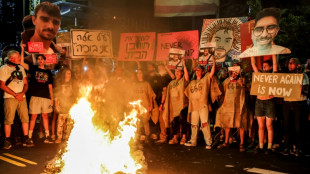
-
 French rider Ferrand-Prevot solos to victory in women's Tour de France
French rider Ferrand-Prevot solos to victory in women's Tour de France
-
Oval downpour leaves England-India series on knife edge

-
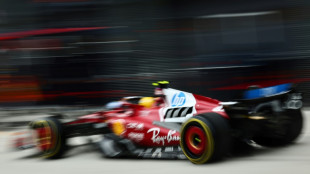 Despondent Hamilton and Ferrari crash back to earth
Despondent Hamilton and Ferrari crash back to earth
-
Norris relishing combat with McLaren teammate Piastri

-
 US trade advisor says Trump tariff rates unlikely to change
US trade advisor says Trump tariff rates unlikely to change
-
Norris wins in Hungary to trim Piastri lead as McLaren reel off another 1-2

-
 Norris wins Hungarian Grand Prix in another McLaren 1-2
Norris wins Hungarian Grand Prix in another McLaren 1-2
-
Brook and Root run riot as England eye stunning win in India decider

-
 Ukrainian drones spark fire at Sochi oil depot
Ukrainian drones spark fire at Sochi oil depot
-
Lando Norris wins Hungarian Grand Prix in another McLaren 1-2

-
 Departing Spurs captain Son in tears on emotional evening
Departing Spurs captain Son in tears on emotional evening
-
Marchand says 'passion' burns bright on road to 2028 Olympics

-
 McIntosh says narrowly missing Phelps feat keeps her 'hungry' for LA
McIntosh says narrowly missing Phelps feat keeps her 'hungry' for LA
-
Eight OPEC+ countries raise production by 547,000 bpd

-
 Marchand, McIntosh dominate as US end turbulent worlds with record
Marchand, McIntosh dominate as US end turbulent worlds with record
-
Marchand, McIntosh rampant as US end turbulent worlds with record

-
 Olympic champ Finke slams 'stupid' criticism of US world swim team
Olympic champ Finke slams 'stupid' criticism of US world swim team
-
Bangladesh protest victim gives evidence at ex-PM trial

-
 McIntosh wins fourth Singapore gold with 400m medley title
McIntosh wins fourth Singapore gold with 400m medley title
-
Siraj strikes for India as England's Brook rides his luck in Oval thriller

-
 Rovanpera delights home crowd with Rally of Finland victory
Rovanpera delights home crowd with Rally of Finland victory
-
Tunisia's Jaouadi pushes through pain for second world gold

-
 Australia's beaming Harris foils Walsh treble bid at swimming worlds
Australia's beaming Harris foils Walsh treble bid at swimming worlds
-
Pope's 'Jubilee of Youth' ends with mass for 1 million pilgrims

-
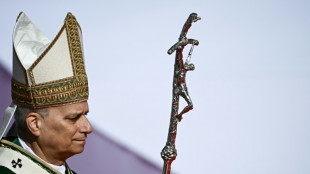 Pope's 'Jubilee of Youth' ends with Rome mass for 1 million pilgrims
Pope's 'Jubilee of Youth' ends with Rome mass for 1 million pilgrims
-
Israel PM says in 'profound shock' over hostage videos
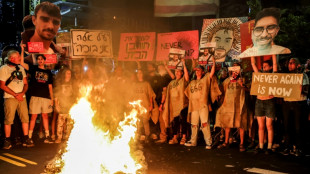
-
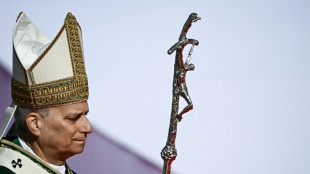 Pope's 'Jubilee of Youth' closes with huge Rome mass
Pope's 'Jubilee of Youth' closes with huge Rome mass
-
Citroen 2CV lovers gather in Slovenia to take the slow road

| SCU | 0% | 12.72 | $ | |
| CMSD | 0.34% | 23.35 | $ | |
| JRI | -0.23% | 13.1 | $ | |
| NGG | 1.99% | 71.82 | $ | |
| RBGPF | 0% | 74.94 | $ | |
| BCC | -0.55% | 83.35 | $ | |
| SCS | -1.47% | 10.18 | $ | |
| CMSC | 0.09% | 22.87 | $ | |
| AZN | 1.16% | 73.95 | $ | |
| GSK | 1.09% | 37.56 | $ | |
| RIO | -0.2% | 59.65 | $ | |
| BTI | 1.23% | 54.35 | $ | |
| BCE | 1.02% | 23.57 | $ | |
| RELX | -0.58% | 51.59 | $ | |
| VOD | 1.37% | 10.96 | $ | |
| RYCEF | 0.07% | 14.19 | $ | |
| BP | -1.26% | 31.75 | $ |

Does Brazilian funk glorify crime? Singer's arrest triggers debate
The arrest of a popular funk singer in Brazil on suspicion of glorifying a powerful crime gang has revived a long-standing debate over the criminalization of a genre born in Rio de Janeiro's gritty favelas, or slums.
Unlike its US namesake, which was popularized by James Brown, Rio funk borrows more from hip-hop, blended with samba and other Brazilian rhythms.
The lyrics, seen by many as celebrating favela drug lords, have repeatedly led to calls for songs to be censored.
Last week, MC Poze do Rodo, one of the genre's best-known artists with 16 million followers on Instagram, was arrested on charges of glorifying crime and having links to Comando Vermelho (CV), one of Brazil's biggest gangs.
The authorities said his arrest aimed to send a message to those "who romanticize and help spread narcoculture."
The police argue that Poze's music "clearly condones" drug trafficking and illegal use of firearms and point to concerts held "exclusively in areas dominated by CV, with a notable presence of traffickers armed with high-caliber weapons."
After five days in preventive custody, the 26-year-old singer was released on Tuesday to a rapturous welcome from waiting fans, who swarmed his car in a column of motorbikes.
Police fired tear gas and stun grenades to disperse the crowds.
Speaking afterwards, the singer claimed he was the victim of police discrimination.
"Rio de Janeiro police don't like me... because I'm black? Because I'm from a favela?"
- 'Singers are not criminals' -
Marlon Brendon Coelho Couto was born in the favela of Rodo, one of the biggest in western Rio.
He has admitted to selling drugs in his youth but says that he abandoned crime to devote himself to music.
Police footage of his arrest at his current home in the upmarket Recreio dos Bandeirantes district, cuffed and shirtless, surrounded by heavily armed officers, caused an outcry among his fans.
Fellow musicians took part in a campaign for his release, organized by his wife, influencer Viviane Noronha, on the grounds that "funk singers are not criminals."
Erika Hilton, a Congress member, argued that by arresting Poze the authorities were seeking to "project all the sins of the world onto black people."
But many rejoiced at seeing the star behind bars, including former far-right president Jair Bolsonaro, an ex-army captain, who posted a picture of the singer with a clown emoji on his Instagram account.
- Arresting the messenger -
Funk describes the reality of life in Rio's crime-blighted favelas.
Poze's lyrics have regularly caused controversy.
In his 2023 track "Homenagem Pra Tropa do Rodo," he pays tribute to men killed "shooting for Comando Vermelho."
The debate surrounding funk's role in crime mirrors long-standing discussions in the United States over the links between rap and violence in Black communities.
Over a decade ago, authorities in the northeastern Brazilian city of Fortaleza passed a law banning venues from hiring artists that incite violence.
Similar anti-Oruam bills, as they are known after the rapper son of a famous drug lord, are now also being debated by several other cities and state parliaments.
Danilo Cymrot, a doctor in criminology at the University of Sao Paulo, pointed to a "gray area" in the definition of glorification of violence, relating to artistic content.
"The artist doesn't necessarily agree with his lyrics," Cymrot, author of a book about Rio funk, said.
He added that "oftentimes, the police and the judiciary have a hard time understanding funk as a work of art."
As a result, he said, the artist's origins are often used to determine whether he condones violence.
"It's less the message itself and more who is singing it."
K.AbuTaha--SF-PST
